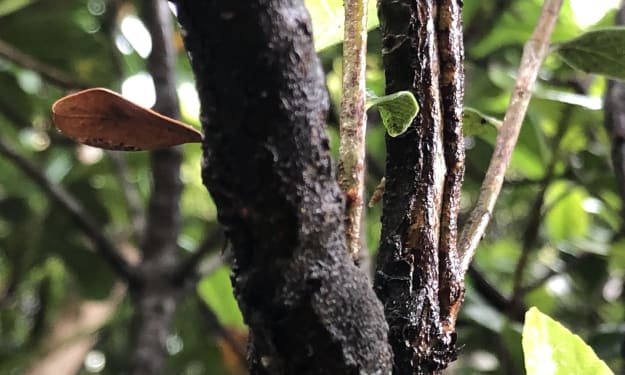
Sasha groaned as she gingerly lifted her head out of the awkward position she had fallen asleep in. She gently peeled her hand from the page it was pressed into, careful not to damage her grandfather’s delicate old journal. It was one of several small black notebooks she had found stacked in a corner of his library after his funeral. Sasha still couldn’t believe he was dead. It felt like the universe had chosen to twist the knife one last time, just for fun. Her mom, dad, and two sisters had been gone for ten years now, and her grandfather had been the only family she had left. Ironically, she’d only met him after she’d lost the rest of her family.
She still doesn’t remember anything about the accident. When she woke up in the hospital, this strange man had introduced himself to her as her grandfather – her mother’s dad – but she was certain she’d never seen him before. At that moment, it occurred to her for the first time how strange it was that she’d never met any of her mother’s family.
Panic washed over her.
Turning to the doctor, she says “I don’t know this man.”
The stranger jumped in before the doctor could respond, “I know this sounds crazy but it’s very nice to finally meet you, even under the circumstances.”
“We checked him out. He is your grandfather. And he’s the only family you have left that we could find,” the doctor explained A social worker entered the room and explained to her what had happened to her family. One line from that day lingers in her memory: “Your parents and sisters are gone,” the social worker had said. That sentence had haunted her quiet moments in the years since.
During her recovery, her new-found grandfather became her rock. He was there as she learned to walk again. The day she got out of the hospital, he took her home in a beat-up Volvo station wagon filled with the dozens of teddy bears she’d accumulated during her hospital stay. On the drive home, nothing looked familiar. “Aren’t we going to my house?” she had asked him. “It’s not yours anymore,” he replied somberly. “Don’t worry though. I was able to get all of your family’s stuff back before they took it.”
It took her a few months to truly feel comfortable in her grandfather’s house but, ten years later when it was time for her to go to university, she realized the house had become apart of her. She never left. Sasha attended a local community college during the days and continued playing board games, watching movies, and taking walks with her grandfather in the evenings.
When he got sick she took care of him by herself; she didn’t trust anyone else. More than that, she embraced the opportunity to give back to the man who had done so much for her.
“He really needs round-the-clock care. You and I are not enough.” his nurse had nurse told Sasha one afternoon after an especially difficult day with her grandfather. “No, he belongs at home” she snapped back. But, out of curiosity, she had touring care facilities to see what they offered. She never got the chance to check him in. He died the following week.
One evening two weeks after the funeral, she sat in her grandfather’s big library chair, surveying the enormous room that was home to years of memories. A stack of little black notebooks in a corner caught her eye. Sasha picked up the first one and began to read. For the next three months, she became consumed by her grandfather’s writings. She read about his university years, military career, and difficult family life: his loves, his triumphs, his losses. The years after his first wife died, leaving him to raise his ten-year-old daughter alone, were especially poignant. Sasha’s grandfather has struggled with the responsibility for a while, eventually sending his young daughter off to a girls boarding school which he thought would do a better job of raising her. In the early years, he would visit her every weekend but their relationship became strained. By the time she was 15, he only visited her a few times a year.
In the meantime, he had gotten close to a female coworker at his university and became engaged to be married. When they got married, he brought his daughter home to be a part of the family but it never quite worked. His daughter was hostile to his new wife and when his wife had her first child, she began to resent her stepdaughter’s demands on her husband’s attention. The wife convinced the husband to send the now 16-year-old back to boarding school so he could focus completely on his new family. After that, their strained relationship was all but dead. The teen never visited or accepted visits from her father again. He continued to pay for her schooling but when she graduated, she cut communication with him completely. They didn’t speak to each other for five years until her father hunted her down on her 23rd birthday to present her with access to the trust fund he’d built for her. In his journal, he wrote that she threw the paperwork in his face in the coffee shop where they met, stormed out, and changed her number. The following year, his second wife disappeared one day while he was at work, taking the baby and all the money from their joint bank account. He never saw them again.
Sasha had fallen asleep on the second to last page of this journal. As she placed a bookmark on her current page, she felt a small booklet sliding from behind the last sheet in the book. It was a bank slip. It had her grandfather’s name on it. It also had another name. She recognized the first name as her mother’s and the surname’s name as her grandfather’s surname. It was the first time she’d seen her mother’s maiden name – Eleanor Gardener – in written format. She skimmed through the pages of the booklet but the ink on the entries had faded to an almost unreadable state. “Holy crap,” she whispered to herself. She hopped on her laptop and Googled the name printed on the front of the booklet: First Chase Bank.
The following morning, she arrived at the lawyer’s office at 8:55 and waited for him on the front steps. While she waited, she read the last page of the little black notebook she had found the bankbook in. At this point, her grandfather had written about the challenges of being a father to a newborn and being estranged from his elder child.
“The baby has many of Ellie’s features – the same big brown eyes, petite nose, an expressive face,” he wrote, “I wonder if she will grow to hate me the way Ellie has,” he added.
When the lawyer appeared in front of her, she felt a pang of remembrance. She hadn’t seen him since he read her grandfather’s will a week after the funeral. He had been calm, professional, detached. “Let’s talk inside,” he says calmly
Standing in his office, she slides the bankbook across his desk. He picks it up and flips through the pages. “Yeah, I didn’t know about this account but it should be pretty easy to get access to it,” he says softly. He picks up his cell phone, searches for a contact, and hits the call button. After a few seconds he says “Hey Jim, an old client of mine found a book that looks like one of yours. Can we drop by? Great, we’ll be there in ten minutes.” He was already standing when he ended the phone call. The ten minute walk to the bank is quiet and it’s a perfect sunny day. When they arrive at the bank, the lawyer walks through the lobby straight to an office in the back.
“Hey, Jim. Thanks for seeing us. This is Sasha Gardener. She’s my former client's granddaughter and she found this in his stuff,” the lawyer explains. “Yeah, this is one of ours. I can look it up for you here but first I’ll need your ID, and a copy of your grandfather’s death certificate.” Jim explains. “I have my ID but I didn’t realize I’d need the death certificate,” Sasha responds. “I picked up my copy on the way out. Here it is,” the lawyer chimes in.
Jim examines both documents then hands them back.
“Great. I can definitely help you out here Sasha. Charles, can you give us the room for a few minutes?” Jim says. Charles steps out into the hallway and closes the door behind him.
“Have a seat, Ms. Buck,” Jim invites her. The minutes seem like ages as he types away at his keyboard. “Sorry, your grandfather’s account was one of our legacy accounts. Those can be a bit tricky to find, but here it is,” Jim explains.
Jim goes on to tell her that the savings account was opened 45 years ago and her grandfather had made regular deposits in it for 22 years. Then there was a thirteen-year gap when no deposits were made. Then he started making monthly deposits again 10 years ago. He’d never withdrawn any money from the account.
“Now, the account balance is $20,000. The note on the front page reads ‘For Eleanor.’ Do you know who that is?” Jim says, finishing his speech. “Eleanor was my mother, but she died ten years ago with my dad and sisters. That’s when I went to live with my grandfather,” Sasha explains.
“I’m sorry to hear that. Well, the law says that this money belongs to you now,” Jim responds. “I wouldn’t even know what to do with it,” Sasha asked, surprised. “You don’t have to do anything with it right now. You can take some time to think,” Jim responds.
Sasha walked out of the bank that day in a haze. In a way, she realized that her grandfather had seen their relationship as a fresh start for himself. An opportunity to be the father he had never been to his own daughter. He poured his soul into their relationship. Sometimes, she would go weeks at a time before she realized that she missed her parents and siblings. When he talked about her mother, the regret dripped from his voice. For all that he had done for her, she hoped that in his final years, he had felt as loved and cared for as he had made her feel.
About the Creator
Colleen Williams
A writer
Enjoyed the story? Support the Creator.
Subscribe for free to receive all their stories in your feed. You could also pledge your support or give them a one-off tip, letting them know you appreciate their work.





Comments
There are no comments for this story
Be the first to respond and start the conversation.